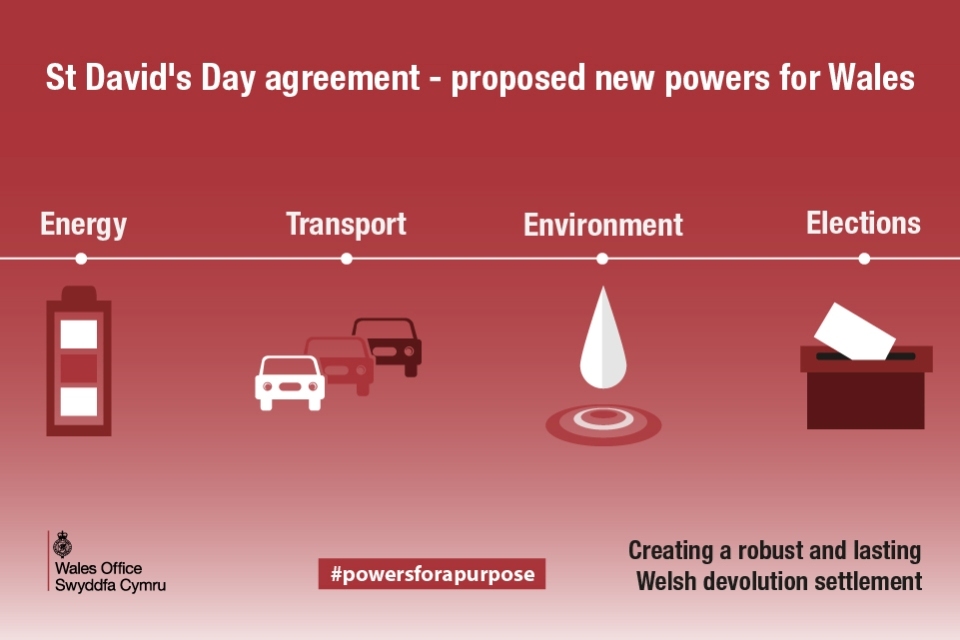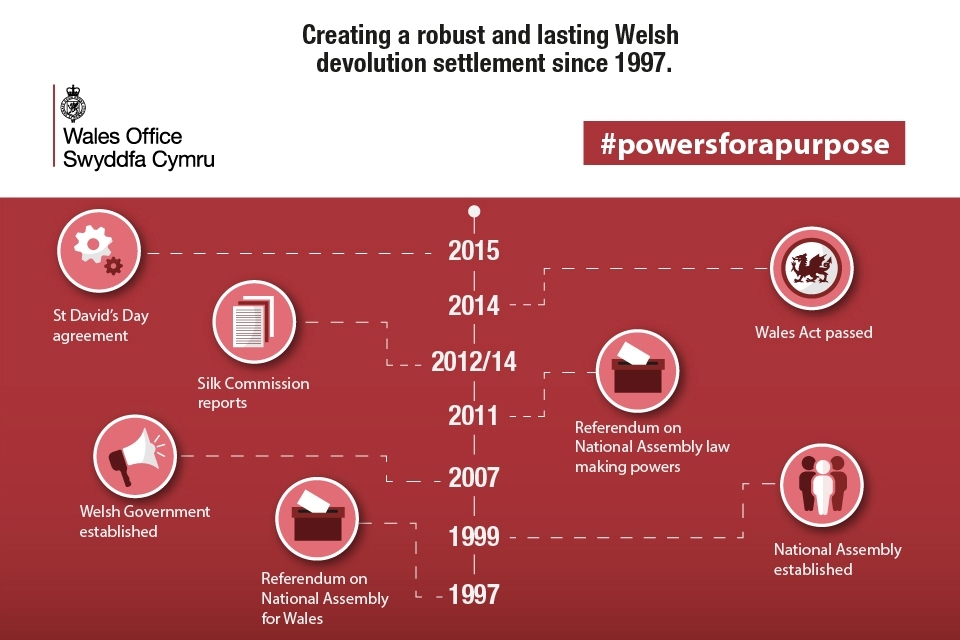Additional powers for Wales - what happens next?
The UK Government has published the St David's Day agreement which provides a blueprint to create a more stable, clearer and long lasting Welsh devolution settlement.

The Senedd building
What happened?
- On 17 November 2014 the Secretary of State for Wales Stephen Crabb announced the Wales Devolution Programme with a commitment to publish the results of the programme by St David’s Day 2015.
- On 27th February, Mr Crabb published the outcomes of the St David’s Day process which represents a blueprint for taking forward Welsh devolution in the next Parliament.
What are the proposed new powers?
- The St David’s Day agreement sets out a strong package of additional powers for the National Assembly, based on political consensus and implements many of the recommendations that the Silk Commission made in its second report.
- They include extra powers in areas such as transport, energy, the environment and elections to the National Assembly and local government elections in Wales.

The Model of Devolution for Wales:
- Wales should move to a “reserved powers model” with the law clearly setting out which responsibilities are devolved to Wales and which remain at Westminster.
- The UK Government has already begun work on a reserved powers model. Once this work is completed we will discuss the proposed model with interested parties, including the Welsh Government and Assembly Commission.
Constitutional Matters:
- Assembly structural and institutional arrangements including elections to the Assembly and local government should be devolved.
- The Assembly should have also the ability to lower the voting age at Assembly elections to 16 if it wishes.
- Taken together, this means the Assembly will be responsible for almost all aspects of its business, from deciding how Assembly Members are elected to determining how its Committees are organised.
Natural Resources:
- The Welsh Government should decide energy projects up to 350 megawatts. This would deliver a much clearer consenting regime and provide the Welsh Government with important new tools to help deliver its energy policy and the transition to a low carbon economy.
Transport:
- Speed limits, port development and bus and taxi regulation should be devolved to the National Assembly. This would complement the powers which the Assembly already has over transport.
- The UK Government is already devolving the Wales and Border rail franchise.
Health:
- The UK Government is committed to continuing its cooperative approach that ensures the NHS in Wales and the NHS in England can work together on specific national initiatives or more locally.
- The Department of Health, NHS England and the Welsh Government are currently reviewing the protocol on cross-border healthcare to ensure future arrangements meet the needs of people and health services on both sides of the border.
Employment and skills:
- Employment and training is a vitally important area where the boundary between devolved and non-devolved services needs to be managed effectively.
- The UK Government is waiting with interest the final recommendations of the inter-governmental Access to Employment.
- Working Group, which has been working over the last year to ensure the effective coordination of employment programmes in Wales.
Broadcasting:
- Welsh Ministers should have the power to appoint one member of the Ofcom board who is capable of representing the interests of Wales.
- The BBC and S4C should commit to sending their annual reports and accounts for laying in the Assembly
- Broadcasting should continue to be regulated at the UK-level given the important role that broadcasters play in the cultural life of the UK and the scale at which the sector operates in the digital age.
Welsh Language:
- The UK Government is fully committed to the Welsh language, and to seeking opportunities to raise the profile of the Welsh language across government.
- The Wales Office is currently undertaking a review of UK government services provided in Welsh to determine how they can better meet the needs of Welsh speakers.
Smith Commission:
- The UK Government will examine the non-fiscal Smith recommendations that are relevant for Wales. This will enable the new government to take decisions early in the next Parliament on whether any further Smith recommendations should be implemented for Wales.
- Licensing of onshore oil and gas extraction in Wales (fracking) should be devolved.
Funding:
- The UK Government will introduce a “funding floor” to protect Welsh relative funding and provide certainty for the Welsh Government to plan for the future and grow the economy.
- The precise level of the floor, and the mechanism to deliver it, will be agreed alongside the next Spending Review.
- This is in the expectation that the Welsh Government will call a referendum on income tax powers in the next Parliament.
Air Passenger Duty (APD):
- The UK Government will consider the case and options for devolving further powers to the National Assembly over APD.

" "
What happens now?
- The outcomes of the St David’s Day process provide a blueprint for a clearer and more stable devolution settlement for Wales.
- The UK Government hopes that implementing them will end the ongoing debate in Wales on the distribution of powers, and enable the devolved institutions to focus their efforts on delivering economic growth, jobs and more efficient public services.
- This political consensus provides a firm foundation a new Wales Bill early in the next Parliament to legislate for a new devolution settlement for Wales.
Read more about the St David’s Day agreement here